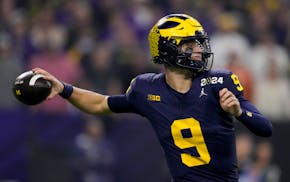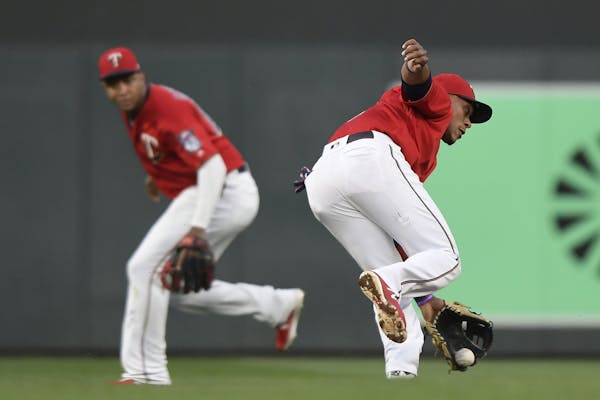The Twins won again on Thursday night, beating the Royals 8-5. If they win six of their last nine games, they will become the first Twins team since 1965 to reach 100 victories in a season, and the second since the Washington Senators were born in 1901.
Rocco Baldelli is making history as a rookie manager, and while he isn't remindful of his predecessors, he values and unintentionally borrows from them.
Tom Kelly will stop by the office. Ron Gardenhire will visit on the field. Paul Molitor brought his son to spring training. All three won the American Manager of the Year Award. Baldelli will be joining them.
"I've had multiple conversations with TK, and sometimes he drops by the office," Baldelli said. "He's locked in. My time around Gardy has been really good. Who doesn't love Gardy? And, truthfully, he's got his team that he's leading right now, but I think he loves the Twins, too.
"I've caught up with Moly a couple of times, too, and we chatted in spring training. He's an important part of this organization and I'm glad when he's around."
Kelly was the gruff strategist, Gardenhire the humorous umpire-battler, Molitor the Hall of Fame player with the keen eye and dry wit. Stylistically, Baldelli is different, but perhaps not as different as thumbnail descriptions might indicate.
Baldelli is known as a modern, analytically driven manager. So was Kelly, who kept his supercomputer beneath his baseball cap.
Baldelli is known for energizing players. Gardenhire's strength was the sheer intensity he brought to the ballpark.
Molitor was erudite and empathetic, remembering his slumps clearly enough that he could relate to his players' struggles. Baldelli, too, can be eloquent and philosophical, and he too, was a top prospect, then a phenom, before injuries and illnesses led to an early leap to the front office.
"My honest view of this is that the analytical label on some of the younger people in our industry is, in my opinion, lazy," said Derek Falvey, Twins chief baseball officer. "If you're around our environment long enough, you know that, yes, we use information to help inform our decisions. In free agency, trades, the amateur draft, player development and major league operations, we're always seeking information.
"But at the end of the day you've got to make a call. I view analytics as information that informs my gut. You're not just shooting from the hip. That's how Rocco works. He wants all of the information, he internalizes it, and then he's ready to make a call."
Baldelli has more information at his disposal than did Kelly. He finds it more valuable than did Gardenhire, and appears to be a less traditional thinker than Molitor, whose greatest strength was his ability to dissect the hidden nuances of the game. In my experience, no one saw the game the way Kelly and Molitor did.
Baldelli is different from his predecessors in this way: He is succeeding while learning his players. Kelly, Gardenhire and Molitor all had their greatest success when relying on players with whom they had a previous bond.
Kelly rode the Southern League buses with Hrbek, Gaetti and the crew. Gardenhire had grown close with the early-2000s Twins as a coach. Molitor worked with the key 2017 players when they were in the minors.
"Managers have been using statistical information forever," Falvey said. "I talked to Jim Kaat and how Whitey Herzog asked him to be a situational lefthanded guy, because left-on-left would get him more outs. That's many years ago."
The common denominator between successful Twins managers seems to be a connection with their players. `That's the key to what Rocco is doing," Falvey said. "Yes, all the decisions he makes are rooted in some kind of analytics, but he knows he needs to go and motivate those guys and make sure they feel supported every time they walk out on the field. He's really good at that."
Historically good, it turns out.

Souhan: Wolves fans made Game 1 special. Now bring on Game 2.

Souhan: Should Vikings even consider McCarthy in NFL draft?

Souhan: NAW erases Suns' lead, Game 1 advantage with big performance

Souhan: This is KAT's chance to prove Flip Saunders was right


